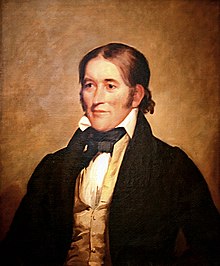David “Davy” Crockett (August 17, 1786 – March 6, 1836) was a 19th-century American folk hero, frontiersman, soldier, and politician. He is commonly referred to in popular culture by the epithet “King of the Wild Frontier”. He represented Tennessee in the U.S. House of Representatives, served in the Texas Revolution, and died at the Battle of the Alamo.
Crockett grew up in East Tennessee, where he gained a reputation for hunting and storytelling. After being made a colonel in the militia of Lawrence County, Tennessee, he was elected to the Tennessee state legislature in 1821. In 1825, Crockett was elected to the U.S. Congress, where he vehemently opposed many of the policies of President Andrew Jackson, most notably the Indian Removal Act. Crockett’s opposition to Jackson’s policies led to his defeat in the 1831 elections. He won again in 1833, then narrowly lost in 1835, prompting his angry departure to Texas (then the Mexican state of Tejas) shortly thereafter. In early 1836, Crockett took part in the Texas Revolution and was killed at the Battle of the Alamo in March.
Crockett became famous in his own lifetime for larger-than-life exploits popularized by stage plays and almanacs. After his death, he continued to be credited with acts of mythical proportion. These led in the 20th century to television and movie portrayals, and he became one of the best-known American folk heroes. This morning the Ullans Academy were delighted to welcome my beautiful friend Daphne Swilling to our company. Daphne has been a friend of the Cherokee nation since she met one of their people remarkably outside the City Hall in Belfast. She hails from Chattanooga, Tennessee and has been responsible for the passing of a resolution through Congress and the Senate in the United States apologising to the Indian peoples for the Indian Removal Act of 1830. Daphne wishes to erect a statue of Davy Crockett, her hero, in Nashville. As a Wisdom Keeper of the Lakota Sioux I welcomed and thanked her in their language, Lakota. In 1994 , as Deputy Lord Mayor to Alderman Hugh Smyth I travelled to Nashville, Tennessee to sign a memorandum of Association between Belfast and Nashville, which are now Sister Cities.
Perhaps the most potent symbol of the American Frontier, Davy Crockett was a determined opponent, political and personal of Andrew Jackson, his fellow Scotch-Irish man. It is therefore not surprising that he opposed Jackson and the issue of forced relocation of the Cherokee people from their ancestral homes in Georgia to Oklahoma through the Indian Removal Act of 1830. But like the Indians whom he was unable to save Davy Crockett became disheartened by Jackson’s continual victories and in 1836 left for Texas and martyrdom at the Alamo.
There was also no greater defender of Indian rights and exposer of official corruption than Sam Houston, also of Scotch-Irish stock, whose citizenship of the Cherokee nation had been approved by their Council on 21st October 1829.
